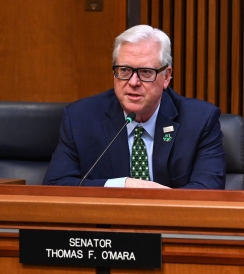All-Electric Buildings mandate should be repealed
From NY State Senator Tom O’Mara,
Over the past several years, I’ve written in this column numerous times about the concerns, the pitfalls, the shortcomings, and the outright unaffordability set in motion following New York State’s enactment of the “Climate Leadership and Community Protection Act” (CLCPA) in 2019.
Slowly but surely over the past several years, those responsible for implementing this mandate-driven energy strategy – namely, Albany Democrats — have been forced to recognize that it lacks affordability, feasibility, and reliability. It has become clear that their strategy, as it stands, won’t work, isn’t reasonable, and goes too far too fast.
In August, for example, the Hochul administration released a “Draft 2025 Energy Plan” clearly acknowledging that the CLCPA timeline under which New York has been rushing to achieve 70 percent renewable energy by 2030 and zero emissions by 2040 isn’t realistic, that it can’t be met under the plan with current technologies as they exist.
It reaffirmed our warnings that these ongoing mandates, if left unchecked, will:
> escalate already skyrocketing utility costs;
> force homeowners to retrofit and electrify their homes to eliminate the use of natural gas at enormous expense;
> destroy consumer choice and freedom; and
> drive up the costs of building homes and homeownership, and accelerate this state’s decline for the next generation.
Late last week the Hochul administration, as part of an ongoing lawsuit, agreed to delay the implementation of a mandate known as the “All-Electric Buildings Act,” which was scheduled to take effect on January 1, 2026. This specific mandate, if implemented, would require all new buildings under seven stories built in New York be equipped with all-electric heating, cooling, and appliances. Among others, the New York State Builders Association (NYSBA) has warned that the cost of these all-electric mandates could drive up the cost of the construction of single-family homes by at least $7,500 and even as high as $25,000 – and that’s before factoring in higher monthly energy bills.
NYSBA estimates that “every $1,000 increase in the price of a home pushes nearly 7,000 New York families out of homeownership.”
While the state agreed to delay the mandate’s implementation in court last week – and that’s the good news – that action in and of itself does little to remove the uncertainty for builders, consumers, ratepayers, and everyone else who would be hit hard if the mandate ultimately moves forward. A spokesperson for the governor said that she “remains committed to the all-electric buildings law.”
That’s not what New York’s homeowners and ratepayers – current and future – need to hear.
It’s time for more decisive action. It’s time to fully recognize that mandates like the All-Electric Buildings Act say no to consumer choice, ignore affordability, impose additional and unreasonable burdens, and drive up costs on builders during what’s already a generational housing crisis in this state. It’s time to take steps to remove any remaining uncertainty. Not long ago, for example, I joined many legislative colleagues calling on the governor to immediately issue an Executive Order giving builders and developers the flexibility and the option to continue doing business under the state’s existing construction code, like other states are doing.
Better yet, the All-Electric Buildings mandate should be repealed.
Mandates like this only serve to make New York State a more expensive place to live and do business. It’s an example of this state imposing far-reaching requirements that are not feasible, affordable, or reliable. The current timeline raises far too many unanswered and troubling questions. It would only deliver an enormous price tag for builders and already overburdened consumers, families, ratepayers, and taxpayers.
While there’s a growing sense of a shift in short- and long-term thinking on one of the central challenges facing New York’s future, will it produce a turnaround? That’s yet another key question moving forward that bears watching. That’s especially true when it comes to the undeniable need for dispatchable power and the role that nuclear power can play, both small- and large scale nuclear, to address ever-rising electricity demands. Experts are projecting enormous and growing demand for chip fab, artificial intelligence, data storage, and other technology services, as well as the increasing volume of electric vehicles, all of which are expected to result in record-high energy consumption in the near future.
Our Senate Republican Minority Conference, among others, has put forth a comprehensive set of proposals to chart a different course. We have called for refocusing on affordability, feasibility, and reliability. We have offered what we believe are commonsense alternatives to the current CLCPA mandates and timelines while providing relief to taxpayers, ensuring the reliability of the grid, and, especially now, ensuring a diverse energy portfolio that will keep energy options affordable and accessible for the long term.






